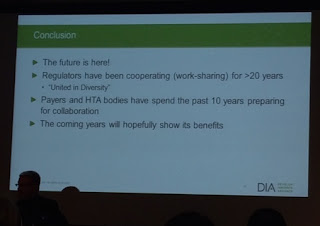Thursday, 11.00- 12.30
How Companies fit all evidence requirements into one development plan
How all evidence requirements (regulators, HTA, payers) fits into one development plan for one product- first talk. So this decides what type of clinical trials we get to see!
Problem is: requirements for regulatory approval- EMA- are different from what HTA bodies (like NICE/ UK or ZIN/ NL) or payers ( like health insurers) want.
It has happened that HTAs rejected regulatory assessment = no access despite drug is approved.
Marlene Gyldmark/ Roche is speaking how the company attempts to integrate how the generate evidence that fulfils BOTH regulatory AND HTA requirements.
Personally, I would always assumed that this was done already...? Why would you want to risk to invest so much and then get stuck so late in the process? But then I'm sure there is something I missed- in any case, NOT good for patients either....
Trying to come up with ONE strategy to fulfil differing HTA requirements- referring to the HTA Core Model ® from EUnetHTA- so it is good to see that harmonisation efforts on the HTA side are showing effect!
Interesting how to combine different types of evidence: clinical trials, real world data and modelling to have an integrated evidence plan. The challenge is integrating three different evidence needs from regulatory, HTA and medical
How will payers react to the future of Drug Development?
Steffen Thirstrup, UKHealth care systems are now the main customers for regulatory and HTA evaluation
RWD has replaced clinical trials as the main source for evidence about effectiveness (and safety)
problem- regulators and HTA haven't developed methods how to use this RWD for evidence-generation
Development of early HTA advice:
competition among reimbursement and payer agencies, so where to turn?
Hopefully, EUnetHTA will change some of that!!
SEED Consortium (14 EU HTA agencies, coordinated by HAS)- early dialogue processes- worth looking up
GetREAL
Very nice summary slide on HTA collaboration :-)
problem remains that health and finances are under national authority.
Interesting suggestion to have conditional reimbursement- something worth thinking about!
How can a joint regulatory-HTA scientific advice process help deliver the right evidence?
Jane Moseley, EMA
Interesting case study from joint advice: large company, small indication, unmet need-
original recommendation was a placebo-controlled study designed.
After multi-stakeholder discussion including EMA, 4 HTA bodies, clinicians, patients and the Pharma let to the adaptation of a different design.
Interview with Jane Moseley on the topic
- Very valid comments
- shared EMA-HTA advice is in patients' interest
- advice needs to happen EARLY to be efficient and guidelines are not sufficient
And yet another case where there is a willingness to alter trial design to a more patient-friendly design: no placebo as the indication was small with high unmet need 'to reduce patient suffering'.
I can't get my head around that argument- in a large indication with high unmet need (where we can get the data), we insist in placebos. In a small indication with high unmet need (where we can't get the data), we are worried about the patient impact.
That means that the suffering of a patient with in a small indication is worse than the one of a patient with a large indication. This makes no sense whatsoever!!!!
Comment in the discussion-
we should not only discuss market entry but also market exit strategies




No comments:
Post a Comment